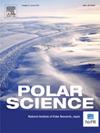揭示北极永久冻土融化的经济影响:在不断变化的景观中探索GDP生产
IF 2
4区 地球科学
Q3 ECOLOGY
引用次数: 0
摘要
自20世纪80年代以来,永久冻土经历了快速变暖。由此导致的永久冻土融化已经导致了经济后果,例如,沿海撤退需要重新安置几个定居点,修复或避免建筑物、机场、铁路、公路和管道倒塌所需的工程成本等。通过计算次国家尺度的国内生产总值(GDP),我们估计了北极环极永久冻土区(ACPR)的总经济价值及其在永久冻土区(ACPR)上产生的潜在损失,并因此可能受到永久冻土区融化的危害。我们的结果显示,2017年的价值为839亿至1893亿欧元。其中约91 - 92%的GDP是在俄罗斯境内生产的。在ACPR中,自然资源开采似乎是GDP的关键驱动力。这意味着,如果永久冻土融化导致经济产量下降,许多依赖俄罗斯ACPR出口的国家将陷入困境。为了避免国际经济中断,ACPR国家的公共当局应该愿意支付永久冻土GDP总额的一定比例,以适应和减少永久冻土融化的经济影响。我们估计适应成本在永久冻土GDP总量的0.01%至14.6%之间。本文章由计算机程序翻译,如有差异,请以英文原文为准。
Uncovering the economic impact of thawing arctic permafrost: Exploring GDP production in a changing landscape
Permafrost has undergone rapid warming since the 1980s. The resulting permafrost thaw has already led to economic consequences, for example coastal retreat requiring the relocation of several settlements, engineering costs necessary to repair or avoid collapses of buildings, airports, railways, roads, and pipelines, etc. Calculating Gross Domestic Product (GDP) at subnational scales, we estimate the total economic value and their potential loss in the Arctic Circumpolar Permafrost Region (ACPR) that is produced on permafrost cover, and as such which is likely to be exposed to hazards from permafrost thaw. Our results give a value of €83.9–189.3 billon in 2017. About 91–92 % of this total GDP is produced on the Russian territory. In the ACPR, natural resource extraction seems to be a key driver of GDP. This means many countries depending on Russian ACPR exports will be in troubles in case of reduced economic production due to permafrost thaw. To avoid international economic disruptions, public authorities in the ACPR countries should be willing to pay a certain percentage of the total permafrost GDP to adapt and reduce the economic impacts of permafrost thaw. We estimate the adaptation cost to be between 0.01 % and 14.6 % of the total permafrost GDP.
求助全文
通过发布文献求助,成功后即可免费获取论文全文。
去求助
来源期刊

Polar Science
ECOLOGY-GEOSCIENCES, MULTIDISCIPLINARY
CiteScore
3.90
自引率
5.60%
发文量
46
期刊介绍:
Polar Science is an international, peer-reviewed quarterly journal. It is dedicated to publishing original research articles for sciences relating to the polar regions of the Earth and other planets. Polar Science aims to cover 15 disciplines which are listed below; they cover most aspects of physical sciences, geosciences and life sciences, together with engineering and social sciences. Articles should attract the interest of broad polar science communities, and not be limited to the interests of those who work under specific research subjects. Polar Science also has an Open Archive whereby published articles are made freely available from ScienceDirect after an embargo period of 24 months from the date of publication.
- Space and upper atmosphere physics
- Atmospheric science/climatology
- Glaciology
- Oceanography/sea ice studies
- Geology/petrology
- Solid earth geophysics/seismology
- Marine Earth science
- Geomorphology/Cenozoic-Quaternary geology
- Meteoritics
- Terrestrial biology
- Marine biology
- Animal ecology
- Environment
- Polar Engineering
- Humanities and social sciences.
 求助内容:
求助内容: 应助结果提醒方式:
应助结果提醒方式:


